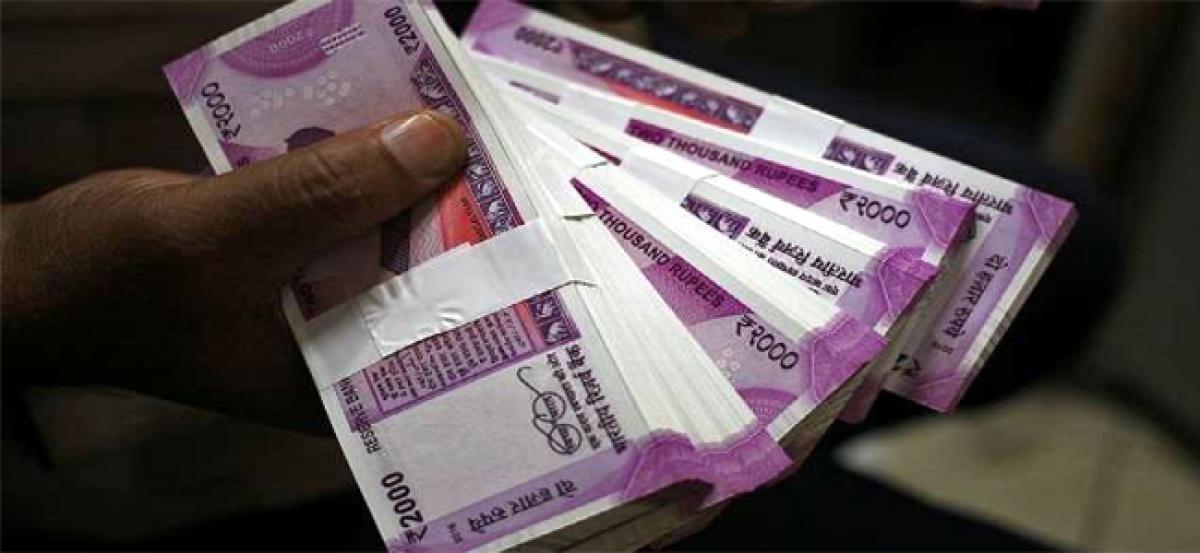Live
- 13 criminals from two gangs arrested in Jharkhand's Ramgarh for extortion
- Union Minister Bandi Sanjay Visits Injured Boy Sritej at KIMS Hospital
- Construction of over 1,000 bridges underway in Assam: CM Sarma
- Telangana IAS Officers wives association meets president Droupadi Murmu
- Nara Devaansh Sets World Record with Checkmate Marathon
- India set to become developed nation by 2047: Haryana CM
- Allu Arjun’s house attacked by protesters demanding compensation for the stampede victim
- Several Gulf countries impose visa ban on Pakistanis over their involvement in crime, fraud and begging
- Public outrage in Jharkhand's Giridih over murder, police station gheraoed
- Santosh Trophy: Meghalaya edge Goa 1-0 to secure QF berth
Just In

Foreign Direct Investment to India decreased to 40 billion dollars last year from 44 billion dollars in 2016 while outflows from India, the main source of investment in South Asia, more than doubled, according to a new trade report by the UN.
Foreign Direct Investment to India decreased to 40 billion dollars last year from 44 billion dollars in 2016 while outflows from India, the main source of investment in South Asia, more than doubled, according to a new trade report by the UN. According to the World Investment Report 2018 by the UN Conference on Trade and Development (UNCTAD) global foreign direct investment flows fell by 23 per cent in 2017, to USD 1.43 trillion from USD 1.87 trillion in 2016. "Downward pressure on FDI and the slowdown in global value chains are a major concern for policymakers worldwide, and especially in developing countries," UNCTAD Secretary-General Mukhisa Kituyi said.
FDI to India decreased from USD 44 billion in 2016 to USD 40 billion in 2017. But outflows from India, the main source of FDI in South Asia, more than doubled to USD 11 billion, the report said.
The report cited India's state-owned oil and gas company ONGC's active investment in foreign assets in recent years. After acquiring a 26 per cent stake in Vankorneft, an affiliate of Russia's national oil company Rosneft PJSC, in 2016, ONGC bought a 15 per cent stake in an offshore field in Namibia from Tullow Oil in 2017.
By the end of 2017, ONGC had 39 projects in 18 countries, producing 285,000 barrels of oil and oil-equivalent gas per day, the report said.
The report said that cross-border merger and acquisitions sales for India rose from USD 8 billion to USD 23 billion driven by a few large deals in extractive and technology related industries.
Singapore's Petrol Complex, owned by Russia's Rosneftegaz acquired a 49 per cent stake of Essar Oil Ltd, the second largest privately owned Indian oil company, for USD 13 billion.
An investor group, including American e-commerce compnay eBay, technology giant Microsoft Corporation and China's multinational investment holding conglomerate Tencent
Holdings acquired a stake in Flipkart Internet for USD 1.4 billion, and Soft Bank acquired a 20 per cent stake in One97 Communications, the parent of digital payments leader Paytm, for USD 1.4 billion.
The report said that globally, the net cross-border M&A purchases of transition-economy MNEs rebounded from USD 809 million in 2016 to almost USD 14 billion in 2017, due to two large transactions, incliding Rosneft acquiring a 49 per cent share in Essar Oil in India for close to USD 13 billion (through its Singapore affiliate, Petrol Complex).
Developing-economy investors from China and South Africa, followed by Singapore, India and Hong Kong (China), are among the top 10 investors in Africa.
The report said that financial uncertainty caused by "significant risks" to global trade is responsible for a sharp fall in international investment flows which could hurt developing countries the most.
Developed economies saw the biggest drop in FDI flows in 2017 at 37 per cent, to USD 712 billion but this was to some extent expected, after a spike in 2016. More concerning is the "lack of (FDI) recovery" among developing economies last year, since FDI is the "largest external source" of finance for developing countries, at around 40 per cent, UNCTAD said.
Looking ahead, global FDI is forecast to see a "marginal" 10 per cent increase by the end of this year, the report said. It notes that this is "below the average", looking back at the past decade and is linked to "significant" risks and "policy uncertainty", associated with "broadening" trade tensions around the world.
US tax reforms approved by Congress this year are also likely to affect future global investment decisions, the report adds. On another key indicator - greenfield investment - which signals how confident parent companies are about building operations in a new region or country - the UN report noted a 14 per cent drop.
UNCTAD's survey shows that modern industrial policies are increasingly diverse and complex, addressing new imperatives, such as GVC integration and upgrading, the knowledge economy, build-up of sectors linked to the Sustainable Development Goals and competitive positioning for the new industrial revolution.
"The new industrial revolution is already affecting cross-border investment patterns. Investment policies must adapt as part of new industrial development strategies," Kituyi said.

© 2024 Hyderabad Media House Limited/The Hans India. All rights reserved. Powered by hocalwire.com







